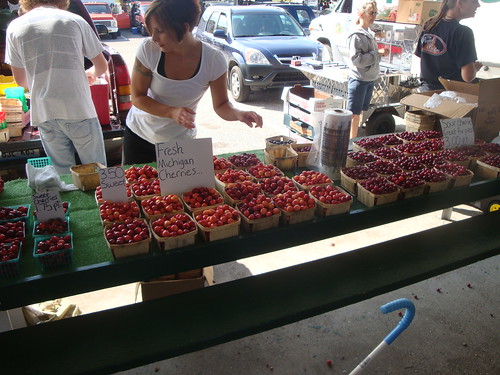
When I think of Michigan, I think of fresh fruit by the half bushel. I think a dozen varieties of cherries, I think dozens if varieties of apples in the fall, I think plums, blueberries, pears, peaches, strawberries, raspberries, and farmers who grow 30 some odd varieties of hot peppers and line them up in order of heat. I think asparagus.
Michigan, as it turns out, ranks second in America for variety of crops. Varietye of crops is underscored in Western Michigan where Lake Michigan creates micro-climates ideal for fruit growing.
Agriculture is a major part of Michigan's economy:
Food processing generates about $25 billion in economic activity in Michigan and employees 134,000 workers. A total of 1 million people — or about 25 percent of the work force — are employed in the state’s $71 billion agriculture industry, which leads the nation in the production of blueberries, beans, tart cherries, cucumbers and squash, with carrots, celery, apples and asparagus ranking second and third. Michigan also is second in the nation in the production of dairy products.

Much of this ties back into the theme of allowing individuals to have the means of production, and reducing regulations whose effect is to shut small time producers out of the pool.
Michigan's new cottage food operation law allows individuals to process foods, such as jams and breads, without a state license or a commercial kitchen up to $15,000 per year, opening a new avenue for Michigan to start competing in the trade of food processing as well as food production.
Michigan is also second in America for dairy production. A relaxing of pasteurization law would allow more small time cheese makers and dairies that cannot afford the equipment to comply with current law...it would also allow an renaissance in cheese production in American and Michigan. Nations like France and England are far more relaxed with their pasteurization and life expectancy in those nations seems to be doing just fine. Laws like these serve only to sideline small dairy producers.
No comments:
Post a Comment